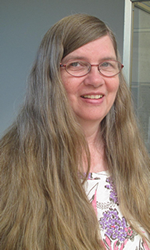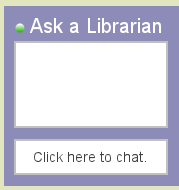Information Update - Fall 2013
Introducing Our Staff: Kay Lopez
 Kay Lopez works as a part-time cataloger in Special Collections and Archives and also as a part-time public services Librarian. Kevin Norris, editor of Information Update, interviewed Kay via Facebook Messenger.
Kay Lopez works as a part-time cataloger in Special Collections and Archives and also as a part-time public services Librarian. Kevin Norris, editor of Information Update, interviewed Kay via Facebook Messenger.-
- KN: You wear several different hats in the Library. Could you tell us about your jobs and what you do?
-
- KL: My job is perfect for me because of the variety of duties I have in the Weinberg Memorial Library. Depending on the day of the week, and the time of the academic year, I can be found on the fourth floor Special Collections/Archives, entering information into the University Archives database. Depending on what materials the various departments send us, we can preserve and provide points of access to what is most important to the University. World Languages is the best about sending their monthly meeting minutes; please send us your minutes!
I am at the Reference Desk every Saturday; actually I am the only Librarian serving on Saturdays. But Saturdays are typically quiet days at the Library, although we have many regulars whom we're always happy to see. If a student is looking for some quiet, Saturdays (we usually open at noon) are the perfect time at WML. -
- Occasionally I have other duties: helping to prepare the Faculty Scholarship exhibit every May, and assisting my colleagues in Special Collections—Michael Knies, or Elizabeth (Beth) Teets. I catalog from time to time, mostly the Rousseau Collection of signed, first edition, leather bound books, or the DVDs which contain University events, previously transferred from videotape by the Media Center staff. Check out the catalog to find the listing.
-
- Sometimes I have the extra treat of working on a special project—helping with deleting records from the catalog of items which have lived out their usefulness and are being sold or recycled, typing up the Friends List of Books for which they so generously donate funds to the library, inventorying the Pacinelli Rehabilitation Collection, which we hope to highlight at the disABILITY Conference this fall. This summer I, along with many others all over the library, worked on entering metadata for the Newspaper Clippings Scrapbook Project to be used in the 125th Anniversary Celebration of the University of Scranton. Once the Scrapbook Project is done, I hope to again work on the Edith Stein collection we received from Sister Josephine Koeppel. And I'm a part-time employee! There's always something worthwhile to do at the library. Variety is the spice of life, and I'm very happy with my many duties at the library.
-
- KN: You certainly sound busy! What is your background?
-
- KL: Librarianship is my second career. My first career was in WIC (Special Supplemental Food Program for Women, Infants and Children) as a nutritionist and county coordinator. I have a master’s degree (Boston University) in nutrition education and believe strongly in WIC, but difficult funding during the Reagan years led me to consider other careers. Knowing computers were going to be everywhere, and considering my computer phobia, I knew I had to learn more. Programming wasn't my cup of tea, so I looked for ways to use computers that didn't involve too much mathematics. Librarianship was the right answer for me considering my love of books and information and my service inclinations. Rutgers University School of Communication and Information was right across the river from where I was living at the time, so it was an easy decision about where to get my MLIS. After obtaining my degree, I worked in a variety of libraries including the corporate library of General Foods (now Kraft) and, after moving to Pennsylvania, at one of the smallest library branches in the state: Smithfields Library on Route 209 in the Poconos. I feel so lucky to work at the Weinberg Library. It's such a beautiful library; I learn something new every day, and I enjoy the people who work here and use the great resources we have.
-
- KN: Is there a lot of difference between working in a small public library and an academic library?
-
- KL: There are many differences between small public and academic libraries: the resources, square footage, number of employees, type of patrons, number of days open, and programming. In public libraries the staff provides reader's advisory, suggesting books the patron might enjoy. In an academic library the emphasis is on research, and we're teaching the students how to access by themselves the scholarly information they require, in the most efficient way, teaching information literacy in every encounter we have.
-
- It's wonderful to have a large, strong institution behind an academic library, one that understands the importance of the library resources and employees in the functioning of the institution. I don’t need to constantly worry about funding, feeling alone. There are entire committees to raise funds to help WML purchase the resources we need. While we all are involved in brainstorming ways to make the Weinberg Memorial Library more efficient and effective, the Dean is the point person in requesting increased funds when necessary. At an academic library there are opportunities to work in teams to solve issues that develop, or just informally discuss ideas with colleagues. There are numerous ways to learn at an academic library via readings, webinars, seminars, courses, and the many lectures offered. I love to learn, and there are so many opportunities available here.
-
- KN: Is there any project that you have worked on at the Weinberg Memorial Library that you have particularly enjoyed or of which you are especially proud?
-
- KL: While I really enjoyed working with my colleague Beth Teets on the Library’s 20th anniversary exhibit, especially the 20th Anniversary Exhibit Trivia Contest, I'm most proud of the University Archives. That's my primary work and fairly exclusively my job, and although very few people ever see it (it's a database with limited access), I think it functions as necessary for the University by organizing materials the University has determined important enough to send over to us. If you have a question about how something was done at the University in the past, give the Archives a call, and we'll see if we have it in the database. The University Archives have been helpful in obtaining materials for the 125th Anniversary of the University.
-
- KN: Can you think of any item in Archives that is particularly unique or interesting?
-
- KL: Michael Knies recently acquired copies of the records of LaSalle's Christian Brothers Collection from when the Christian Brothers were managing St. Thomas College. These plus previous records in the archives, including Scranton Diocesan archives' Christian Brothers collection donated to University Archives, have proven helpful in the 125th Anniversary Celebration. University Archives contains biographical information on most of the Christian Brothers and Jesuits who presided over St. Thomas and the University of Scranton. Lots of interesting history is awaiting the needs of researchers. The controversies, the accomplishments, the mundane -- all are included in the University Archives.
-
- KL: For someone who works part-time you sound terribly busy! What is your life like when you are not at work?
-
- KN: Sometimes I feel even busier outside of work. My passions are my family, social justice, and travel. My two extraordinary children are now grown and pursuing their careers. I’m very involved with the Social Justice Committee at my church where we work on equal rights for all including LGBTQ rights, anti-racism, and combating white privilege. I’m also on the Pennsylvania Human Relations Commission-Monroe County Advisory Council, and the Unity Coalition of the Poconos.
-
- I’m working on my “bucket list” of travel adventures. I’ve been very fortunate to see all lower 48 states, and hope to travel to Hawaii and New Zealand someday. While I’ve visited my partner’s homeland of Spain and other parts of Europe, I also hope to spend a month or so in Italy once I retire.
-
- KL: Many thanks to my birth family for taking our family camping throughout the United States when we were young, and for giving me the travel bug gene; that's how I got to visit the lower 48. There are pieces of each state I like—amazing views, historic places, wonderful food, interesting people, but I like mountains, hills, valleys and bodies of water as my favorite topography, with changes of seasons. I appreciate being close to university towns and major cities to develop a more educated population, and greater opportunities to learn and enjoy culture. So my thoughts are California and Virginia as my favorite states, with the variety of topography they offer plus the benefits of oceans. Maine has these ingredients also—just a little too chilly much of the year. There are too many people in many of my favorite states, plus the cost of living needs to be considered, in addition to being fairly close to family and friends—so I'll stick with Pennsylvania, for now.
-
- KN: And we hope you stick with The University of Scranton, as well. Thanks for the interview, and good luck with your work and travels.
 Kay Lopez works as a part-time cataloger in Special Collections and Archives and also as a part-time public services Librarian. Kevin Norris, editor of Information Update, interviewed Kay via Facebook Messenger.
Kay Lopez works as a part-time cataloger in Special Collections and Archives and also as a part-time public services Librarian. Kevin Norris, editor of Information Update, interviewed Kay via Facebook Messenger.
